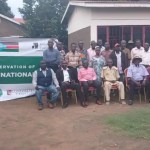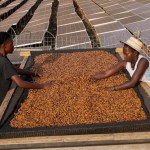(YEI) – Coffee farmers in Yei River County of Central Equatoria State say insecurity and recurring wildfires are preventing the revival of one of South Sudan’s most promising cash crops, undermining both local livelihoods and national export prospects.
Farmers argue that peace and stability are essential to restore coffee production, which once made Yei a hub for exports to regional and international markets. Since 2016, insecurity has displaced thousands of families and left many coffee farms abandoned, forcing traders and consumers in South Sudan to depend on imports from Uganda and the Democratic Republic of Congo.
Coffee grower Arike Taban from Otogo Payam said the insecurity has left his farmland inaccessible and overgrown. He fears wildfires during the dry season could destroy what remains. “We want peace and security so that we can return to our farms and reduce poverty through coffee production,” he said.
Other farmers shared the same concern. Asu Moses from Lun village in Mugwo Payam said fertile land is lying idle because of insecurity. He said peace would enable him to expand into large scale farming, providing income for his family while contributing to national economic growth. Another farmer, Gama Peter, stressed that conflict continues to erode livelihoods, arguing that peace is the only way to restore productivity and development.
Local authorities have acknowledged the farmers’ concerns. Commissioner Emmanuel Taban Seme has reiterated that the county government supports reconciliation and local dialogue as a tool for socio-economic recovery. He has urged residents to denounce violence and embrace peace to allow farming to thrive again.
Yei was once South Sudan’s leading coffee-producing region, with exports reaching Juba, Khartoum and international markets during the 1980s. In 2016, international organisations TechnoServe and Nespresso confirmed that Yei coffee ranked among the finest globally, selling in France, the United Kingdom, Germany, Switzerland, the Netherlands and the United States.
Since 2011, development programmes have trained over 700 South Sudanese farmers, established five cooperatives and built modern wet mills. The first exports of South Sudanese coffee reached France, part of an effort to diversify an economy overwhelmingly dependent on oil revenues.
At the current official rate of $1 = 4,600 South Sudanese Pounds (SSP), every SSP 4.6 billion is equivalent to $1 million. Analysts say that scaling up coffee exports could create significant foreign exchange earnings and provide much needed diversification for South Sudan’s economy.
Although insecurity has disrupted physical training and monitoring, organisations have adapted by offering remote agronomy support through radio broadcasts and advice hotlines. Farmers continue to maintain their knowledge, hoping to revive production when conditions allow.
A 2019 report by the United Nations Mission in South Sudan (UNMISS) noted that Yei used to experience peak agricultural production in January, but widespread conflict has led to the abandonment of many fields. Food production has fallen, further increasing the importance of cash crops such as coffee as a potential driver of economic recovery.
Despite the setbacks, Yei’s farmers remain determined. They insist that with peace and stability, coffee farming could again support thousands of households, restore exports and strengthen South Sudan’s position in global specialty coffee markets.
Coffee Production and Trade Potential in Yei
| Period / Indicator | Development / Status |
|---|---|
| 1980s | Yei coffee exported to Juba, Khartoum and international markets |
| 2011 onwards | Training of 700+ farmers, formation of 5 cooperatives, wet mills built |
| 2016 | Yei coffee ranked among world’s best by TechnoServe & Nespresso |
| Current Situation (2025) | Farms abandoned due to insecurity, heavy reliance on imports from Uganda and DR Congo |
| Exchange Rate | $1 = 4,600 SSP |
| Revenue Potential | SSP 4.6 billion = $1 million in export value |


















































